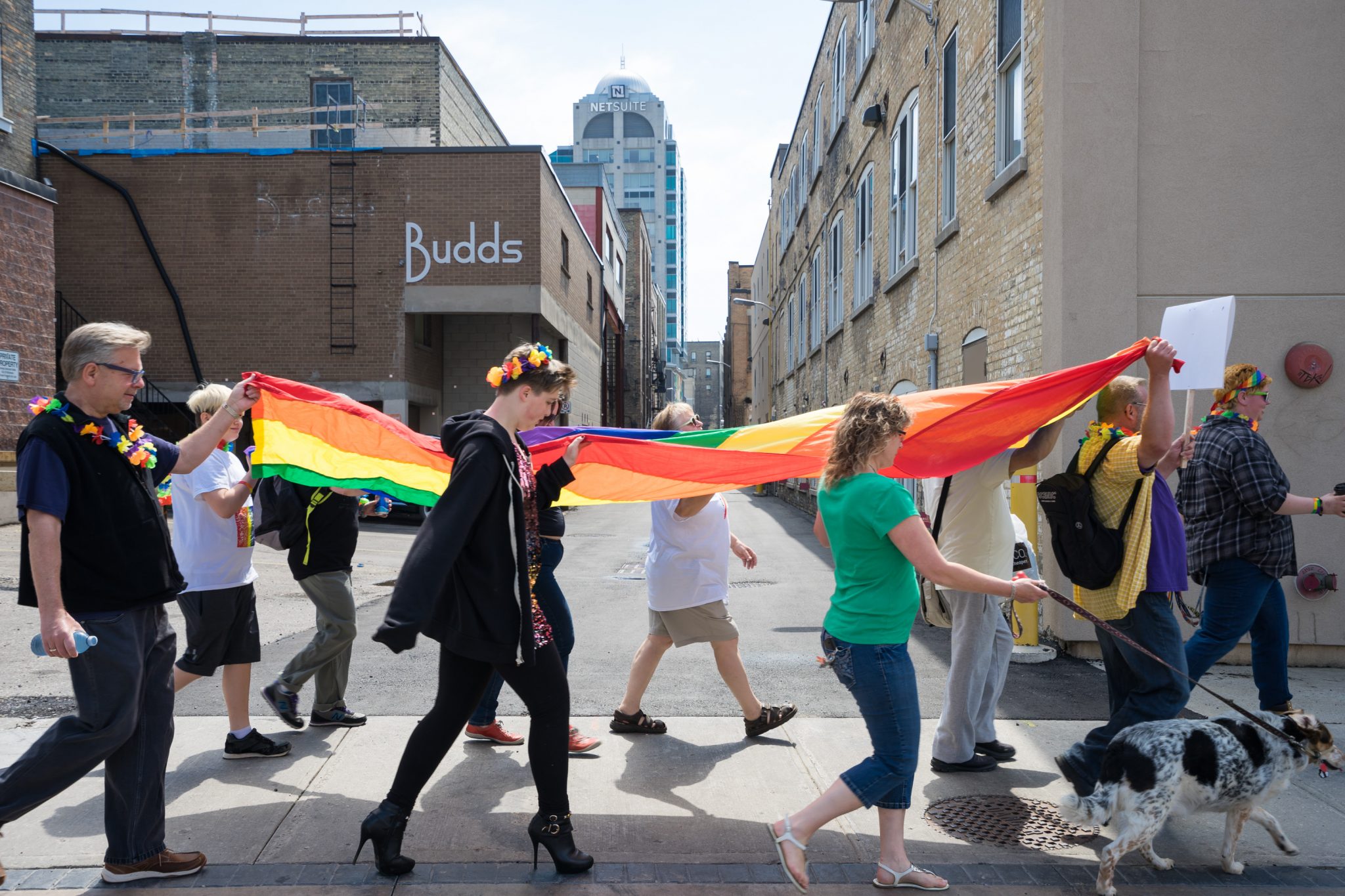Any LGBTQI2SA+ pride festival helps bring together people from all sorts of backgrounds, experiences, ages, genders, orientations, and directions. Pride helps give language and visibility to queer kids and elders alike by bridging intergenerational gaps of queer narratives. What is lacking in these recent years of pride festivals is a critical examination of what systemic barriers queer folks are facing who are marginalized in different ways. Police do not belong in pride.
The limitation of police as an institution is about accountability and reconciliation for a rich history of violence and oppression towards queer and trans people. The key aspect here is to understand that by limiting police as the institutional force they are is a form of reconciliation that predominantly supports queer and trans black, indigenous, and other people of colour. This topic of police inclusion has ignited reactionary racism by a lot of white queers.
What a lot of us white queer folks don’t always get is how our whiteness protects us from very real realities of police brutality as a whole. This includes a history of violence and “power over” as well as racial profiling towards queer and trans folks of colour. Pride isn’t just about our individual love styles, genders, expressions, styles of fucking, or fagotry. Pride is about our culture of survival and our history of resistance to systems of oppression that were enforced by institutions like police to devalue, erase, invalidate, harm, or wipe us out entirely.
When we include police in pride we ignore the history of violence our elders fought so hard to disrupt. Sure, police protect us today – they protect our rights and freedoms. Yet why are people of colour not given the same treatment as white folks? Why is it that during every International Trans Day of Remembrance we light vigil candles for mostly trans women of colour? Why are black men murdered all over North America by armed officers, or the criminalization of sex workers running at extensive rates, or the ways that prisons separate and confine trans bodies, or why are armed forces deployed to violently mass arrest indigenous land defenders at a disproportionate rate?
Police oppression has a deep history of targeting folks of colour while upholding colonialism. When we accept police into pride, we accept the history of violence of police oppression and compromise the safety of already marginalized peoples.
What tri-Pride has done by including Waterloo Region Police Services without any opportunity for community feedback is wrong and misrepresentative of our local rainbow community as a whole. In particular, trans women and femmes of colour, queers who are homeless, queer sex workers, queer youth, and neuroatypical queer people. This has made tri-Pride unsafe for so many marginalized folks who don’t have the same opportunities as white cisgender queer people have.
Many queer and trans folks, especially black, indigenous and other people of colour, don’t have the privileges of time, energy, and access to sit on year long committees to organize. I am also considering the many other queer folks who cannot provide honest feedback because of their job security, family or social access and their roles may hinder their public voice. Providing open and anonymous feedback about matters around institutional violence is important in fostering safer pride festivals for everyone.
I must be clear here and state that I am not by any means excluding individual people whose job happens to be a law enforcement officer. There is a big difference of visibility and power that uniforms hold whether you choose to acknowledge it or not. Police are not an oppressed group. Police as an institution uphold the systems of power that oppress people. If you’re a queer or trans officer, welcome to pride! Leave your uniform at home. That is your employment. You don’t see Starbucks baristas adorning their uniforms or doctors ornamenting stethoscopes at pride. Again, this issue about including police in pride is about the institution not the individual. This is about the impact of a history of violence that has yet to be rectified when queer and trans folks of colour and Indigenous peoples are harmed at disproportionate rates. Us white queers need to do better.
Moreover, police institutions need to do a lot of work to better themselves. The recent news outbreak of the gross and violent misconduct by Waterloo Region Police Services officers illustrates that police as an institution are an oppressive force that need to account for themselves. I am referencing the class-action lawsuit of women police officers who were subject to sexual harassment and abuse within a culture of misogyny. If Waterloo Region Police Service cannot conduct themselves with respect towards each other in their magical uniforms, how do you think they treat marginalized bodies without the powerful microscope of the media?
I have been humbled to be part of a growing support network of queer and trans folks within the Region of Waterloo since 2010 who take care of each other. We are building a community who challenge social injustices together. We don’t want to sit as bystanders while injustice happens. We understand that intent is different than impact. We recognize that our queer and trans liberation is not mutually exclusive and that all forms of oppression need to be addressed in order to create a safer and just world. This is why I am writing about police and pride. This is why I am using my whiteness to illustrate this point.
Where do all queer folks belong? If tri-Pride doesn’t want to include queer and trans folks who work under anti-oppressive and feminist frameworks in building accountable community spaces yet include police as an institution, it begs the question “who is pride even for?”
Ethan Jackson is a co-founder of Plan B Co-operative KW.




Leave a Reply